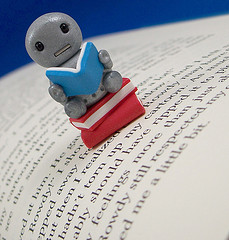
- How we’re on the verge of an amazing new open web: Ben Werdmuller of WithKnown lays out the IndieWeb argument:
The social web was a proof of concept. We needed a space to experiment…. We’ve learned a lot about social behavior. We understand how to create a great user experience that people find comfortable to use; we understand how to make it easy to share and to publish. Those things didn’t come easily, but we have them, and the learning was made easier by creating simpler architectures: centralized systems where user activity could be observed.
It’s time for the next step.
Open follows closed. We know that we need to open our platforms, and that mass surveillance by governments around the world is a problem. It’s even fair to say that it’s a problem that’s been enabled by creating these centralized proofs of concept. Luckily, the next evolution of the web is taking place.
The idea is simple: instead of everyone giving all their information to a site like Facebook, they keep it themselves, but still get to communicate easily using all of the great user experience discoveries we’ve made. You can still share selfies, make friends, listen to music together and share links, but now you do it in a space that’s really yours, and that you get to have more control over.
The IndieWeb movement will be a key thread of what I’m covering here at Wordyard.
-
Jennifer Ouellette is interviewed about her new book on the science of self, Me, Myself, and Why, on public radio’s Science Friday (this bit is at the 23′ mark):
Q: These days the self is online…. Do you think that social media has changed our selves in a fundamental way? In other words, now that we have the avatar, Facebook self, Twitter self, have we given away a part of the self? Do we need that now, because everybody else does it, to be a fully whole self?
A: I don’t really see it as something new or dangerous. Believe it or not, I think that what we’re doing is pretty much the same thing we’ve always done when it comes to how we manage our public self. It’s just that there’s now a new realm into which we’ve extended it. One of the most amazing things about the self, and how the brain processes and constructs the self, is that it’s so flexible — it can expand and contract and adapt. And that public face, your avatar or your Twitter handle or that thing that goes out into public to represent you, is an extension of you. And we’ve always done that, whether it’s through magazines, or books, or cameras taking photographs. I think it’s always natural to assume every time there’s a new technology, that something is being lost. But it’s just a different realm, and the brain is doing what it’s always done.
Q: As [your twitter handle and Second Life avatar] JenLucPiquant, do you think that’s allowed you to do things you wouldn’t do in normal life?
A: She’s a fun thing, because she sometimes is my mouthpiece if there’s something kind of snarky that I don’t really want to say, I can put it in her mouth, and she can say it, and it gives me a little bit of distance. But only a little, because more and more it’s starting to become an extension of me.
- Copyranter: BuzzFeed’s Native Advertising Is Nothing But A Confidence Game: [via Andrew Sullivan] There’s nothing new about camouflaging ads as editorial matter; it’s been going on as long as there’ve been ads and publications. (It was known as “advertorial” when I was a wee lad.) All that’s different today is the pattern on the camouflage. What’s constant is the pressure from the advertisers to blur the differentiation between the ad and the not-ad.
This post offers an arresting take on today’s “native-ad” mania, refreshingly from the perspective of an ad guy — Mark “Copyranter” Duffy, who wrote ad reviews for Buzzfeed till he was let go.
Duffy explains why “native ads” will fail: They serve neither the advertiser nor the reader, though at the moment they are filling Buzzfeed’s coffers and filling the “flavor of the month” niche of the Web ad business.
Looking at BuzzFeed’s daily layout, it’s obvious that they’re praying to God you don’t notice that their ads are in fact yucky ads. It is purposely deceptive….
The kicker is: BuzzFeed’s native advertising is really—ultimately—terrible for brands. But it’s great for BuzzFeed. And this giddy circle jerk underway between media sites desperate for revenue and misguided advertisers desperate to feel instant gratification, continues….
…I would have asked [Buzzfeed VP Jonathan] Perelman this question: “What percentage of people who click BuzzFeed’s ad posts remember who the advertiser was?†Their data slicksters probably don’t put that number up on the wall, because I guarantee you it’s a very low one.
- Today’s song speaks for itself: Graham Parker’s “Passion is No Ordinary Word” — this live version is from 1979.

